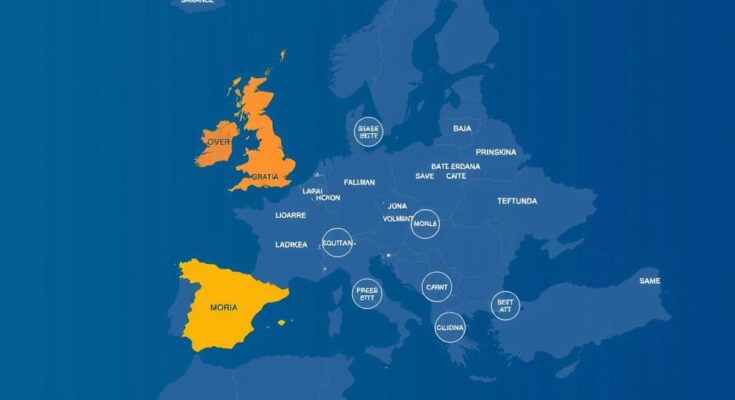The EU seeks new strategies to address unwanted migration, contemplating the establishment of return hubs in countries like Uganda and Uzbekistan. Amidst growing anti-immigration sentiment, EU leaders support measures to expedite deportations while grappling with legal and humanitarian challenges. As countries like Italy consider processing asylum claims in Albania, significant questions remain about the implications for refugee rights and international law.
The European Union (EU) is actively seeking host nations to accommodate migrants deemed undesirable under its new immigration strategy. This shift follows the EU’s leadership’s endorsement of previously marginal ideas regarding asylum seekers. Among these proposals is the creation of “return hubs,” akin to a formerly proposed British scheme involving the deportation of unsuccessful asylum applicants to Rwanda. Furthermore, the EU is contemplating the relocation of individuals granted asylum to secure third countries. Poland’s Prime Minister Donald Tusk has garnered EU support for a plan that includes suspending asylum rights due to an influx of border crossings stemming from Belarus. European Commission President Ursula von der Leyen emphasized the necessity for measures that are “:temporary and appropriate.” The late-night summit highlighted the increasing influence of anti-immigration factions within the EU, a shift reflected in hard-right electoral successes in Austria, Germany, and the Netherlands. However, the practicality of these new strategies is under scrutiny given legal concerns regarding the potential for exposing individuals to conflict or suffering. The concept of establishing return hubs for deported individuals poses complex challenges, including considerations about detention duration. While Uganda has been proposed as a potential destination for asylum seekers denied refuge in the EU, Italy is advocating for the return of refugees to Syria. Meanwhile, discussions between the German government and Uzbekistan officials also aim to facilitate the return of deported migrants, with a focus on favorable conditions for labor migration. Italy has launched a program intended to handle asylum claims in Albania, which encountered setbacks due to concerns about the health and age of some migrants. The EU reaffirmed its commitment to developing means to prevent irregular migration within the confines of EU and international law, calling for decisive actions to expedite deportations, or returns as referred to in EU terminology. Dutch Prime Minister Dick Schoof articulated, “These are innovative solutions that should in principle interest our colleagues here.” Efforts are ongoing to engage countries like Uzbekistan and Uganda, with the latter already hosting a significant refugee population from neighboring nations. Despite the economic growth indicators in Uganda, inherent issues regarding human rights and governance complicate any potential agreements. The previous UK government’s ambition to deport migrants to Rwanda was recently abandoned, raising further doubts about the feasibility of similar EU strategies. Overall, as the EU grapples with the complexities of handling asylum seekers, the scope for collaboration with countries like Albania, Uzbekistan, and possibly Uganda will likely expand, alongside continuous discussions about the right to asylum within the bloc.
The European Union is navigating a challenging landscape of immigration and asylum policies, prompted by increasing numbers of arrivals and the growing presence of nationalist and anti-immigrant political sentiment across various member states. This has resulted in discussions around the relocation and deportation of migrants to other countries. As different member states propose novel approaches to asylum management, there is a notable tension between maintaining human rights standards and enforcing stricter immigration controls. The economic and geopolitical dynamics surrounding potential host nations are critical, with some countries expressing readiness to assist while others underline existing refugee burdens. Monies from development aid and cooperation agreements are influencing these strategies, but international law concerning refugee treatment complicates the implementation of such policies.
In summary, the EU is exploring unconventional solutions for managing unwanted migrants, including the establishment of return hubs and engaging with countries such as Uganda, Uzbekistan, and Albania. While there is a consensus on the need for more robust strategies to address irregular migration, significant legal and ethical challenges must be addressed to ensure compliance with international norms. The evolving political landscape within the EU, marked by increasing anti-immigration sentiment, calls into question the future of asylum rights in the region as member states seek to balance humanitarian obligations with public pressure to control migration flows.
Original Source: www.thenationalnews.com




